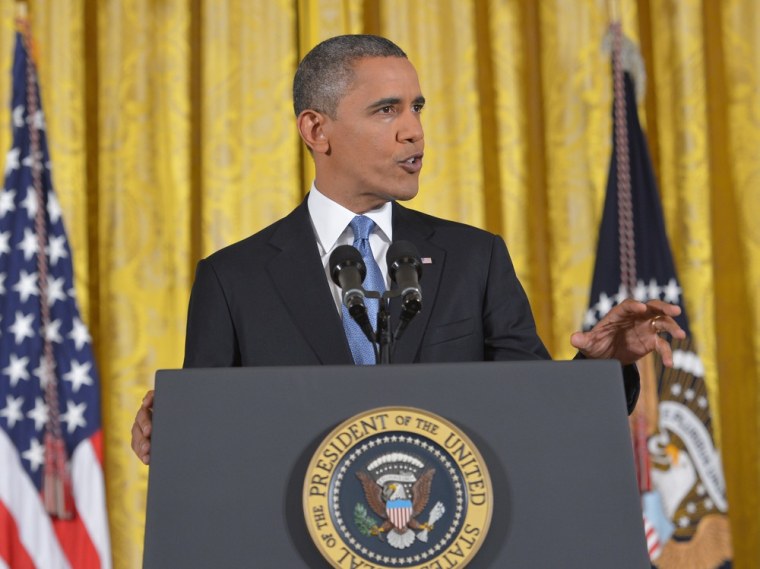
Updated 2:44 p.m. ET - President Barack Obama claimed a broad mandate for his vision on taxes at his first news conference since being re-elected, demanding that his negotiations with Congress yield a specific plan that results in a higher tax burden for the wealthiest Americans.
Speaking Wednesday at the White House, the president said that his recently-concluded campaign against Republican nominee Mitt Romney sent a "very clear message" as to which tax plan Americans prefer. Citing his decisive victory last Tuesday, Obama vowed to stand firm on asking the wealthy to shoulder a greater share of the tax burden.
"There is a package to be shaped, and I'm confident that parties -- folks of goodwill in both parties can make that happen," Obama said. "But what I'm not going to do is to extend Bush tax cuts for the wealthiest 2 percent that we can't afford and, according to economists, will have the least positive impact on our economy."
Related - Obama: 'No evidence' of national security harm in Petraeus scandal
Republicans on Capitol Hill have said since the election that they are open to increased revenue by way of tax reform linked with entitlement reform. But Obama suggested that the GOP's version of tax reform -- cementing or lowering existing rates, combined with the elimination of certain loopholes -- would not be sufficient.
"It's very difficult to see how you make up that trillion dollars -- if we're serious about deficit reduction -- just by closing loopholes and deductions," the president said. "The math tends not to work."
He later added, in a snipe at Republican thinking on taxes: "What I will not do is to have a process that is vague, that says we're gonna sorta, kinda raise revenue through dynamic scoring or closing loopholes that have not been identified."
The expiring 2001 Bush tax cuts, which Obama extended for two years in 2010, are half of the looming "fiscal cliff," the combination of the end of those tax cuts with a series of automatic spending cuts set to begin in 2013, which economists warn could imperil the recovery. The simultaneous debates on taxes and spending are, generally speaking, a byproduct of congressional gridlock on those issues for the better part of the last two years.
The press conference, Obama's first formal meeting with the Washington press corps since the summer, marked his most direct assertion of a second term agenda since winning re-election. He spoke of the need to address taxes and spending, as well as immigration, and he forcefully defended his ambassador to the United Nations, Susan Rice, from Capitol Hill Republicans who argue Rice erred in responding to the Sept. 11, 2012 attacks on a U.S. diplomatic mission in Benghazi, Libya.
Rice is thought to be a leading contender to succeed Hillary Clinton as leader of the State Department, though Obama said he had made no determination as to a nominee for that role. But he forcefully rebuffed a small chorus of Senate Republicans, lead by Sens. John McCain, R-Ariz., and Lindsey Graham, R-S.C., who have vowed to block Rice from that job should he win the nomination.
"If Senator McCain and Senator Graham, and others want to go after somebody? They should go after me," a blunt Obama said. "When they go after the U.N. ambassador, apparently because they think she's an easy target, then they've got a problem with me."
But the fiscal cliff is most likely to consume much of the political oxygen in Washington in the coming weeks and months, particularly as the specter of tax hikes loom on Jan. 1. He renewed his demand that Congress send him a bill extending existing tax rates for all but the top income bracket, something which Republicans have refused to do for the better part of this year for fear of losing a bargaining position.
The president claimed a broader mandate on other domestic issues, too. He said that his staff had already begun conversations with lawmakers in pursuit of comprehensive immigration reform, a priority that had eluded his administration -- to the consternation of Latino voters -- during his first term.
"My expectation is that we get a bill introduced and we begin the process in Congress very soon after my inauguration," Obama said.
At the same time, the president suggested some priorities from his first term -- such as legislation to address the impact of climate change -- would take a backseat to other issues at the outset of his second term.
"I don't know what either Democrats or Republicans are prepared to do at this point," he said, noting that regional differences between lawmakers have just as often scuttled a wide-ranging deal on climate legislation as partisan differences. He furthermore said that economic and jobs growth were his foremost priority, and that he wouldn't support a climate deal that inhibited either.